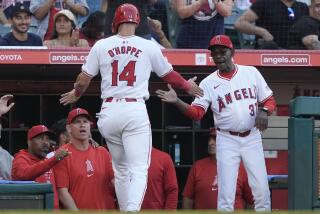Angels are trying to harvest better crops down at the farm

- Share via
Scott Servais knew what he was getting himself into when he took over the Angels scouting and player development departments two years ago.
The farm system he inherited was ranked as the worst in Major League Baseball by Baseball America. Two years of ill-advised trades had left the team with no minor league depth and two winters of big free-agent signings had left it void of a first-round draft pick for two years. The Angels also had virtually no presence in Latin America, a hotbed for talent.
To Servais, the situation felt familiar.
“That’s exactly where we started in Texas,” said Servais, the Angels’ assistant general manager, who helped take the Rangers’ player development system from No. 28 to No. 1 in five seasons. “We recognized where we were at. So I’ve been there.”
On Monday, the Angels also recognized where they were at — in fourth place, 13 games back in the American League West — and began laying the foundation for what they hope will be their minor league renaissance. They traded veteran left-handed reliever Scott Downs to the Atlanta Braves for right-hander Cory Rasmus, a triple-A prospect 12 years younger.
The trade came one day after the Angels put slugger Albert Pujols on the disabled list, and it could be taken as a sign that the organization is waving the white flag on this season. If so, General Manager Jerry Dipoto may move more pieces from his big league roster to restock the bare cupboards in the minor leagues, just as the Rangers once did.
But it won’t be as easy in Anaheim as it was in Arlington.
For starters, the Angels, with a number of lucrative, long-term contracts, are built to win now. The Rangers, on the other hand, sacrificed performance at the big league level over several seasons to rebuild their farm system. Texas finished an average of 16 games out of first place in the AL West in the four seasons before 2010, when it won the division and reached the World Series for the first time in franchise history.
Then the Rangers spent lavishly. In 2011, Servais’ last year in Texas, the Rangers invested $8.4 million on two 16-year-old outfield prospects from the Dominican Republic. And six weeks after Servais left, the team spent $111.7 million to land Japanese pitcher Yu Darvish.
Further complicating things for the Angels is that the game has changed since then, with new rules limiting what a team can spend on bonuses. The Angels had $2.998 million to use on its 37 picks in the amateur draft and less than $2 million on its international free agents this summer, a fraction of what the Rangers spent.
“It was a little bit easier to do back then,” Servais said. “You can still get it done, but it won’t be as easy to turn it around quick. It’s going to take some time.”
The Angels’ farm system was ranked as the best in the sport in 2005, the middle of a period in which it signed and developed 11 players who were on April’s opening-day roster. Since then, it hasn’t so much withered on the vine as it has been systematically dismantled.
Over the last three years, the Angels traded away pitching prospects Patrick Corbin and Tyler Skaggs to the Arizona Diamondbacks along with minor league infielders Alexi Amarista and Jean Segura, who are everyday players for the San Diego Padres and Milwaukee Brewers, respectively. Corbin and Segura were All-Stars this year with Corbin ranking among the top four in the National League in victories (12) and earned-run average (2.24), and Segura was seventh in the NL in hitting through Sunday.
Of the players the Angels got back in those deals, only closer Ernesto Frieri remains with the club. And efforts to replace those prospects have been hampered by the signings of free agents Pujols, C.J. Wilson and Josh Hamilton the last two off-seasons, which left the Angels without a first-round pick in each of the last two drafts.
Internationally, the Angels — who signed and developed Latin players such as Ervin Santana, Erick Aybar, Kendrys Morales and Alberto Callaspo as well as Segura and Amarista over a seven-year span — disappeared after former general manager Tony Reagins fired international scouting supervisor Clay Daniel in 2009 in the wake of a baseball-wide bonus-skimming scandal.
In an effort to rebuild the team’s presence in Latin America, Dipoto moved the team out of its dilapidated Dominican facility near San Pedro de Macoris and into a modern baseball academy outside Bolsa Chica in May. And six months before that he hired Carlos Gomez, with whom he had worked while with the Diamondbacks, as the team’s international scouting director.
But it could be another three or four years before any of Servais’ draft picks or any of Gomez’s international signings arrive at the big league level or even have a major effect in the minors, where the team’s top prospect, double-A third baseman Kaleb Cowart, was hitting .219 with more strikeouts (94) than hits (83) before Monday.
“It kind of goes in cycles,” Servais said. “The reason we have the gaps, obviously, is there were players that were traded.”
“They gave away some players that turned out to be very good,” said an NL player personnel executive who was not authorized to speak on the record about another team’s talent. “They’ve had a lot of prospects they’ve traded, so [the farm system] has depleted.”
It’s a bind Servais has been in — and escaped from — before.
“You’ve got to have a plan. The type of player that you’re scouting and you’re hoping to sign,” said Servais, who has used more than half the Angels’ picks in his first two drafts on pitchers.
“We’re well on the way here. So we hope that it will pay off.”
twitter.com/ @kbaxter11
More to Read
Go beyond the scoreboard
Get the latest on L.A.'s teams in the daily Sports Report newsletter.
You may occasionally receive promotional content from the Los Angeles Times.







